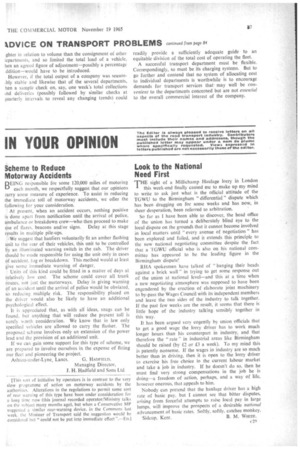IN YOUR OPINION
Page 89

If you've noticed an error in this article please click here to report it so we can fix it.
Scheme to Reduce Motorway Accidents
BEING responsible for some 120,000 miles of motoring
each month, we respectfully suggest that our opinions carry some measure of experience. To assist in reducing the immediate toll of motorway accidents, we offer the following for your consideration.
At present, when an accident occurs, nothing positive is done apart from notification until the arrival of police, ambulance or breakdown crew—who then proceed to make use of flares, beacons and/or signs. Delay at this stage results in multiple pile-ups.
We suggest that hauliers voluntarily fit an amber flashing unit to the rear of their vehicles, this unit to be controlled by an illuminated warning switch in the cab. The driver should be made responsible for using the unit only in cases of accident. fog or breakdown. This method would at least give some immediate warning of danger.
Units of this kind could be fitted,in a matter of days at relatively low cost. The scheme could cover all trunk routes, not just the motorways. Delay in giving warning of an accident until the arrival of police would be obviated, so reducing multiple risk. The responsibility placed on the driver would also be likely to have an additional psychological effect.
It is appreciated that, as with all ideas, snags can be found. hut anything that will reduce the present toll is surely worth consideration. We know that in law only specified vehicles are allowed to carry the flasher. The proposed scheme involves only an extension of the power lead and the provision of an additiOnal unit.
If we can gain some support for this type of scheme, we are prepared to involve ourselves in the expense of fitting our fleet and pioneering the project.
Ashton-under-Lyne, Lancs. G. HADFIELD, Managing Director, J. H. Hadfield and Sons Ltd.
[This sort of initiative by operators is in contrast to the very slow programme of action on motorway accidents by the authorities. Alterations in the regulations to permit some sort of rear warning of this type have been under consideration for a lonc time now (this journal recorded operator/Ministry talks on the subject many months ago), but when a Conservative MP suggested a similar rear-warning device, in the Commons last week, the Minister of Transport said the suggestion would be considered but "could not be put into immediate effect ".—Eol
Look to the National Need First
THE sight of a Millichamp Haulage lorry in London this week-end finally caused me to make up my mind to write to ask just what is the official attitude of the TGWU to the Birmingham " differential " dispute which has been dragging on for some weeks and has now, in sheer desperation, been referred to arbitration.
So far as I have been able to discover, the head office of the union has turned a deliberately blind eye to the local dispute on the growl& that it cannot become involved in local matters until "every avenue of negotiation" has been explored and failed, and it extends this principle to the new national negotiating committee despite the fact that a TGWU official who is also on his national committee has appeared to be the leading figure in the Birmingham dispute!
RI-IA spokesmen have talked of banging their heads against a brick wall" in trying to get some response out of the union at national level—and this at a time when a new negotiating atmosphere was supposed to have been engendered by the erection of elaborate joint machinery to by-pass the Wages Council with its independent members and leave the two sides of the industry to talk together. If the past few weeks are the result, it seems that there is little hope of the industry talking sensibly together in this way.
It has been argued very cogently by union officials that to get a good wage the lorry driver has to work much longer hours than his counterpart in industry, and that therefore the "rate" in industrial areas like Birmingham should be raised (by £2 or £3 a week). To my mind this is patently nonsense. If the wages in industry are so much better than in driving, then it is open to the lorry driver to exercise his free choice in the current labour market and take a job in industry. If he doesn't do so, then he must find very strong compensations in the job he is doing--a freedom of action, perhaps, and a way of life, however onerous, that appeals to him.
Nobody can pretend that the haulage driver has a high rate of basic pay, but I cannot see that bitter disputes, arising from forceful attempts to raise local pay in large lumps, will improve the prospects of a desirable national advancement of basic rates. Softly, softly, catchee monkey.
Sidcup, Kent. B. M. WHITE.
















































































































































